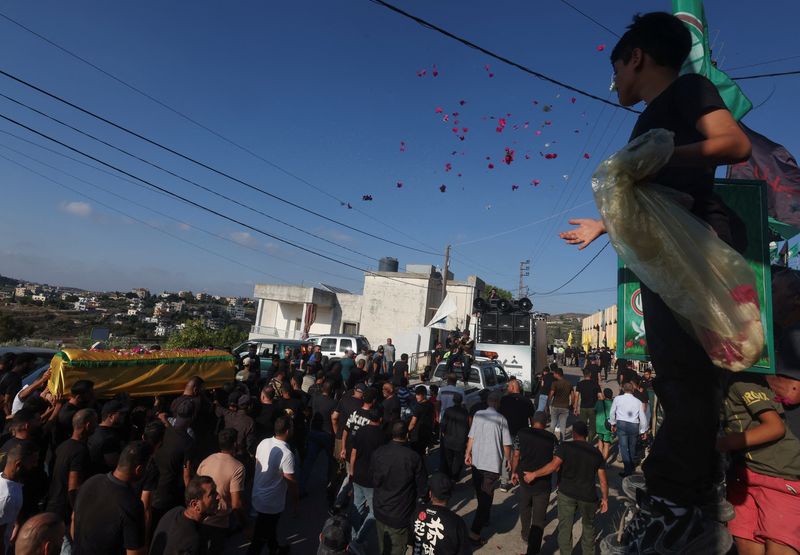By Maya Gebeily, Timour Azhari and Laila Bassam
BEIRUT (Reuters) – Lebanon's Hezbollah failed to evacuate its sensitive sites or top officials on the outskirts of Beirut before this week's attack that killed a senior commander. The Hezbollah movement thought U.S. diplomacy would prevent Israel from attacking the area, security sources close to the group and diplomats said.
Hezbollah was under the impression that Israel would not attack the southern suburbs or Dahiyeh, a heartland of support for the Shiite Muslim group. Hezbollah believed that Israeli forces would adhere to the unofficial red lines that both sides generally apply in the conflict that escalated during the Gaza war, they said.
The assessment was relayed to Reuters by eight diplomats with knowledge of recent Washington-led mediation efforts, including France and the United Nations, and three security sources close to Hezbollah. All spoke on condition of anonymity because of the sensitive nature of the subject.
That understanding was shattered Tuesday when an Israeli strike on Dahiyeh in Beirut killed Hezbollah’s top military commander, an Iranian military adviser and five civilians. Lebanese officials and Hezbollah are now questioning whether diplomatic assurances were properly passed on to the group.
“We didn't expect them to attack Beirut, and yet they attacked Beirut,” Lebanese Foreign Minister Abdallah Bou Habib told Reuters.
Combined with the assassination of Ismail Haniyeh, the leader of the Palestinian armed group Hamas, in Tehran a few hours later, this threatens to plunge the entire region into a violent decline.
Tensions rose after a deadly attack on the Israeli-occupied Golan Heights on July 27, which Israel blamed on Hezbollah and vowed retaliation. The group denied any involvement.
Diplomats rushed to limit the fallout by urging Israel not to attack Dahiyeh as part of its response. U.S. envoy Amos Hochstein specifically delivered those messages, several diplomats and a Lebanese official with direct knowledge of the mediation efforts told Reuters.
A Hezbollah official said mediators had informed them of such efforts. The Lebanese official and three diplomats involved in the reporting said Israel had made no commitments.
'DIPLOMARY HAS FAILED'
Yet Hezbollah's stance exuded a certain calm: in the days leading up to the attack, senior officials from the group were seen around Dahiyeh.
Hezbollah had evacuated some of its key locations in southern and eastern Lebanon in anticipation of possible attacks, but took no similar measures in Beirut, two security sources told Reuters. Hezbollah figures living near the targeted building were seen running outside in panic after it was hit, the sources said.
A regional diplomat said this meant Israel had no major Hezbollah targets to strike in southern or eastern Lebanon. Two European diplomats said Hezbollah had not taken protective measures in Beirut and “was not being cautious.”
Several diplomats, including a Western envoy, said they understood that Dahiyeh would be spared. “A clear message was sent” that Israel would spare major cities, including Beirut, one diplomat said.
Instead, they said, Israel avoided trying to limit its response. “Israelis don't listen to a word we tell them. They follow their plan and don't listen to us,” one of the European diplomats said.
The Western envoy and an Iranian official said Israel had “crossed red lines” by attacking Dahiyeh. “Diplomacy has failed,” the envoy told Reuters, saying the ability of countries, even the United States, to influence Israel was limited.
Hezbollah leader Sayyed Hassan Nasrallah said in a speech marking the funeral of slain commander Fuad Shukr on Thursday that Israel “does not know to what extent it has crossed the red lines” and that unnamed countries had asked the group not to respond to the attack — a request he rejected.
MISCALCULATION
International efforts to contain Israel's military assault on the Gaza Strip – a response to Hamas's cross-border attack on Israel on October 7 – have had limited success.
The United States has called on Israel to unblock aid supplies to Gaza, avoid civilian casualties and refrain from a large-scale military offensive in Rafah, but Israel's diplomatic efforts have yielded few results.
“The Israelis feel that they are being attacked from all sides, politically and militarily, and that is quite a risky situation,” a Western diplomat told Reuters.
As a result, Israel has changed the rules of war and launched more brutal attacks against Iranian, Lebanese and Palestinian opponents, diplomats and analysts in the region said.
Hezbollah had “misread” Israel's thinking and thought it had done enough to deter Israel from bold attacks in Lebanon, according to several diplomats working on the matter and the Lebanese official.
“Hamas, Israel, Hezbollah and Iran have all miscalculated and misjudged each other since October 7,” the Western envoy said.
(Reporting by Maya Gebeily, Timour Azhari and Laila Bassam in Beirut; Editing by Samia Nakhoul and Ros Russell)

